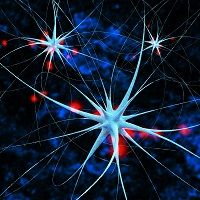Article
Researchers See ALS as a Protein Clumping Disease
Author(s):
Amyotrophic Lateral Sclerosis (ALS) may have more in common with Alzheimer's Disease and Parkinson's Disease than previously thought, a bi-coastal team of chemists reported in Proceedings of the National Academy of Sciences.

Amyotrophic Lateral Sclerosis (ALS) may have more in common with Alzheimer’s Disease and Parkinson’s Disease than previously thought, a bi-coastal team of chemists reported in Proceedings of the National Academy of Sciences.
Brian Crane , professor of chemistry and chemical biology at Cornell University and colleagues used pulsed dipolar electron spin resonance (ESR) spectroscopy to detect subtle changes to the copper-containing proteins in cells.
Researchers know that inherited ALS often occurs because of genetic defect that allows free radicals to degrade a protective enzyme called copper zinc superoxide dismutase 1 (SOD1). The team found evidence that SOD1 mutations case ALS by destabilizing the SOD1 protein structures. That triggers protein movement in which they clump around healthy cells and kill them.
“ALS in this form appears to be a protein aggregation disease, much like Alzheimer’s and Parkinson’s diseases, “ Crane said in an interview with the Cornell Chronicle.
Using ESR spectroscopy, the researchers were able to see mutated proteins in SOD1 for the first time, he said.
They also found that ALS symptoms got more severe as the levels of protein aggregation rose.
Their hope is that ESR could be used to find these SOD1 mutations early before ALS symptoms develop. That in turn might lead to the development of drugs that could stabilize the proteins and prevent ALS.
The PNAS paper, "Aggregation Propensities of Superoxide Dismutase G93 Hotspot Mutants Mirror ALS Clinical Phenotypes” was written by Crane in collaboration with researchs at the Scripps Research institute in La Jolla, CA.




